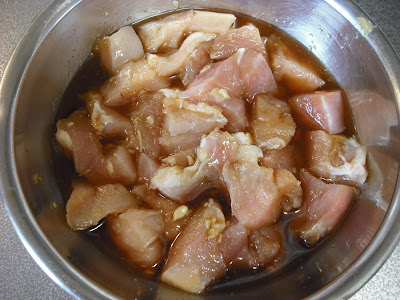Today, I finally got around to making aji no nanban zuke for supper tonight.
今日はやっと夕飯にアジの南蛮漬けを作ることができました。
Yesterday, I bought one pack of aji for 198 yen, which contained eight aji of various sizes.
昨日、アジを1パック、198円で買いました。色々な大きさのアジが八尾入っていました。
They were all too big to be called ko aji or mame aji, so I filleted them in a usual way, and cut each fillet into two or three parts.
どれも小あじ、豆あじと呼べる大きさではないので、普通に三枚におろし、切り身をそれぞれ二つ、三つに切りました。
One Tupperware container was not enough to contain the deep-fried aji, and I had to use two!
揚げたアジを入れるのにタッパーの容器一つでは足りず、二つ使いました。
The nanban sauce is a 3:3:1 mixture of vinegar, soy sauce, and sugar.
I didn't add any red peppers, because I used some "kagura nanban", a local vegetable similar to green peppers but hot like red peppers, together with green peppers and onions.
南蛮ソースはお酢、しょう油、砂糖を3:3:1で混ぜたもので、赤唐辛子は入れませんでした。「神楽南蛮」という、ピーマンに似ていて、赤唐辛子のように辛い地元の野菜を、ピーマンと玉ねぎと一緒に使ったので。
I also made chicken karaage, using two breasts.
胸肉を使って鶏の唐揚げも作りました。
I personally prefer chicken breast karaage, but most Japanese think chicken thigh karaage is superior.
個人的には鶏の胸肉の唐揚げのほうが好きなのですが、大抵の日本人は腿の唐揚げのほうが優れていると思っています。
About one hour or so later, the nanban zuke already looked delicious.
一時間程度で、南蛮漬けはもう美味しそうになりました。
And, it was delicious.
そして、本当に美味しかったです。
Subscribe to:
Post Comments (Atom)





6 comments:
Hiroyuki, I am happy to see you share my chicken breast preference :-)
Your nanban zuke looks much better than mine... Maybe I'll make another one and make new photos before I post it... I am glad to see that your marinade doesn't cover the whole fish. I have made my nanban zuke according to Shizuo Tsuji's recipe (like you suggested) and was worried it wouldn't marinate properly because there was so little liquid. Finally it was very good and I see I had more or less as much marinade as you.
Sissi: Japanese cuisine tends to remove excess fat from fatty ingredients. Yakitori (skewered and grilled chicken) and unagi no kabayaki (grilled eel) are typical examples.
I first made sauce from 75 ml vinegar, 75 ml soy sauce, and 25 ml sugar for the first batch of deep-fried aji, but because of the large amount of onion, green pepper, and kagura nanban, the sauce wasn't enough, so I added 25 ml vinegar, 25 ml soy sauce, and some sugar. For the next batch, I made sauce from 90 ml vinegar, 90 ml soy sauce, and 30 ml sugar, and I transferred some of the vegetables from the first container to the second. I hadn't expected that only eight rather small aji would yield so much aji no nanban zuke.
As you may know, it is important to marinate the aji in the sauce immediately after deep-frying it, so that the vegetables are "cooked" from the heat.
I'm looking forward to seeing your version of aji no nanban zuke!
My friend who runs Chinese food supplies gave me a bunch of peking-duck wing, yesterday.
Without thinking any longer, I put it all in a large pan with some water, vinegar and soy sauce(Kikkoman-natural brew, mixed with Thai-light soysauce <-this one taste more sweet than kikkoman, so I didn't add sugar)
Then, slowly cooked around a hour.
It most likely nanban zuke (but slightly more light taste)
For some hour in chiller, the sauce starts thickened like gelatin. That was great taste!! Sadly, can't eat it all, it was too much!!(笑)
fred: Peking-duck wing?? Lucky you!! You can have the leftover wings tomorrow, and then you will find them tastier! How lucky you are!
Thank you, Hiroyuki, for the answer!
Yes!! It's really delicious!(笑)
Post a Comment